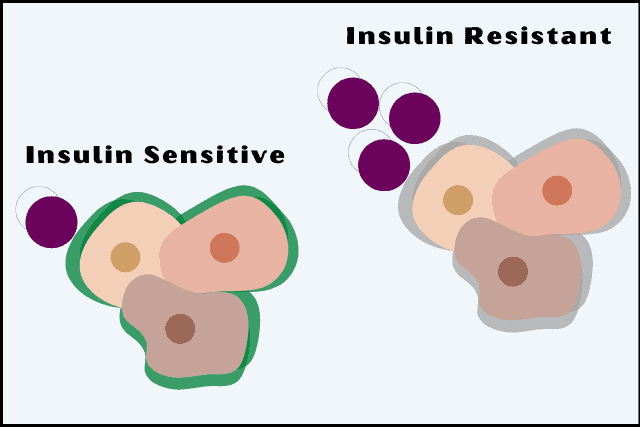Abstract
Insulin is a hormone made by the pancreas that allows your body to use glucose for energy. Insulin sensitivity refers to how well the cells in your body respond to insulin and uptake glucose from the blood. Recent research has reported that standing is associated with better insulin sensitivity; hence increasing the standing time on a daily basis might help prevent chronic diseases.
What Is Insulin Sensitivity?
If your body is sensitive to insulin, it means that it can transport glucose from your blood into the cells to be used as an energy source.
A high insulin sensitivity results in a faster and more effective movement of glucose into cells.
Low insulin sensitivity is also called insulin resistance. The cells of the body do not respond to insulin, and as a result, do not absorb the glucose. This leads to high glucose levels in the body, eventually resulting in type 2 diabetes.
Image: Insulin sensitive vs Insulin resistant
Symptoms Of Low Insulin Sensitivity
- Extreme thirst or hunger
- Feeling hungry even after a meal
- Increased or frequent urination
- Tingling sensations in hands or feet
- Feeling more tired than usual
- Frequent infections
Association Between Standing And Insulin Sensitivity: The Study
A group of researchers from the University of Turku investigated the associations between insulin resistance and sedentary behavior in inactive working-age adults.
The participants had an increased risk of developing type 2 diabetes and cardiovascular diseases.
This study was published in the Journal of Science and Medicine in Sport and reported that standing is associated with better insulin sensitivity.
The researchers observed the following:
- Standing was associated with better insulin sensitivity - irrespective of physical activity, sitting time, and fitness level of the participants.
- Replacing a part of daily sitting time with standing can lead to better insulin sensitivity.
- Daily standing time may help prevent lifestyle diseases even if physical activity recommendations are not met.
The researchers further aim to study if reducing daily sitting time by an hour can impact energy metabolism and fat accumulation in the liver and the whole body.
Recommendations To Improve Insulin Sensitivity
- Losing weight is an effective way to lose belly fat and increase insulin sensitivity.
- Practice stress-reducing activities such as yoga, as unwanted stress can lead to diabetes, obesity, and high blood pressure.
- Prioritize a good night's sleep.
- Include foods that are rich in soluble fiber like legumes, oatmeal, flaxseeds, and Brussel sprouts in your diet.
- Reduce intake of simple carbohydrates and added sugars.
Summary
- Insulin sensitivity refers to how sensitive the body's cells are in response to insulin.
- High insulin sensitivity allows the body to use blood glucose more effectively, reducing blood sugar.
- According to a recent study, increasing your standing time can improve your insulin sensitivity irrespective of other factors like physical activity and sitting time.
- Losing weight, reducing stress, and following a healthy diet are a few effective ways to improve insulin sensitivity.
.
References
https://medicalxpress.com/news/2021-09-association-insulin-sensitivity.html





